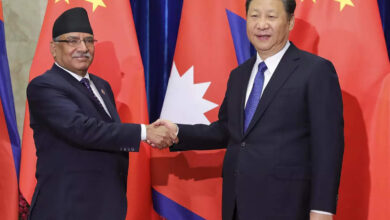‘China’s interactions with South Asia hinge on Nepal’
Professor Hu Shisheng, director of South Asian Studies at the China Institute of Contemporary International Studies (CICIS), on a range of issues between Nepal and China.

Professor Hu Shisheng, who serves as the director of South Asian Studies at the China Institute of Contemporary International Studies (CICIS), is a prominent Chinese scholar on Nepal and the Indian sub-continent. He also regularly advises the Chinese government on Nepal-related matters. Hu talked to Purushottam Poudel on a range of issues between Nepal and China. Excerpts:
How does China view Nepal?
When it comes to Nepal, China has various perspectives. One significance of Nepal is that it is located between China and the South Asian subcontinent. So Nepal can work as a bridge between them. The China-India border demarcation could take a long time to settle and in this scenario, Nepal is the only bridge between China and South Asia. When it comes to other South Asian countries, China has no diplomatic relations with Bhutan whereas Pakistan is more a West Asian nation in terms of its geography. China emphasises Belt and Road Initiative (BRI) in Nepal so that it can work as a bridge in the sub-continent.
The other reason China values Nepal is due to the Tibetan region. We know before 2005—when King Gyanendra entered into a comprehensive agreement with China to stop illegal emigration of Tibetans—each year, nearly 2,000 Tibetans emigrated to the outside world, and this happened for nearly 20 years. The major road for those illegal Tibetan emigrants was through Nepal. Illegal Tibetan emigrants caused great trouble for China. Therefore, for the proper development of the Tibetan region, China also wants good relations with every political party and institution in Nepal. This is why we support the infrastructure development of the country’s Armed Police Force.
Cultural ties are the third important factor in China-Nepal relations. One billion Chinese are followers of Buddhism. They are obsessed with visiting the birthplace of Gautam Buddha in Lumbini. Good relations between the two countries can also foster the pilgrimage of Hindu followers to Kailash Manasarovar, which lies in Tibet. The two countries can make a cultural corridor. For this, people-to-people understanding is very important.
The leftist parties are still very powerful in Nepal. The communist parties of the two countries have played big roles in their respective countries and in building the economies. We can foster an ideological partnership.

Nepal has enormous water resources. We could develop a sub-regional power grid. And environmental protection could be another area of cooperation. This region’s biodiversity is unique. We need to undertake a collective study on how to protect the environment.
Many believe Chinese interest in Nepal is directly related to the security of the Tibetan region. You seem to be one of them.
The Tibetan issue is important for China, for its security and development. When it comes to Tibetan issues, China is not apprehensive about Nepal per se. We are more worried about Nepal being used by third countries or anti-China groups. We know Nepal will do no harm to China, but we doubt it can withstand temptation or pressure from third parties. We value China-Nepal relations for its own sake and also for the potential of our broader relations in the sub-continent.
If we subtract the Tibetan issue from Nepal-China relations, will Nepal still carry significance for China?
Yes China has relations with the South Asian subcontinent and that goes through Nepal. As the China-India border conflict could continue in the near future, China’s interaction in the sub-continent will depend on Nepal. Apart from that, China and Nepal share cultural and economic relations too. If Nepal can be a bridge between the two giants, that can make a big difference. Therefore, Nepal’s importance to China is not only because of Tibetan issues. Suppose, in the future, we resolve the border problem with India, at that time Nepal’s significance to China might be reduced. However, before that, if China and Nepal build a solid relationship then Nepal’s significance will remain high. Even if China established diplomatic relations with Bhutan in the future, Bhutan cannot play the role of Nepal. Bhutan is too small and more India-dependent.
Earlier it used to be said that China does not meddle in the internal affairs of other countries. But of late it seems to be meddling a lot in Nepal, especially when the communists are at the helm.
China suffered for over a hundred years when foreign powers meddled in our internal politics. So not interfering in the internal matters of other countries is the guiding principle of our foreign policy. With the continued increase in Chinese influence, neighbouring countries are increasingly factoring in China. This way, China is not interfering, but has become a part of the local policy. More than interfering in the internal policies of other countries, we are looking for constructive engagement.

Chinese activities in Nepal during the rule of the Nepal Communist Party were due to the changed political environment in Nepal. The two largest communist parties of Nepal coming together was an unprecedented event in Nepal. It was a good opportunity for China to cooperate with Nepal so China might have tried to grab the opportunity. When President Xi Jinping visited Nepal in 2019, he said bilateral relations between the two countries had entered a new era. When the relations entered a new era the Chinese mission in Nepal had to engage with Nepal more than ever.
It might also be the result of Chinese diplomats changing their work approach. After Xi Jinping became President, he encouraged diplomats to be more energetic. That is why many Chinese ambassadors in different countries have become more vocal. Interactions between Chinese and Nepali leaders might increase their understanding of each other.
The leftist leaders are still in favour of uniting Nepal’s scattered communist parties. Does China still want a communist unity in Nepal?
China will encourage the communist parties of Nepal to unite. We believe unity is strength. There are so many parties in Nepal. In India, the coalition government before 2014 failed short of fostering much economic development. Though some provinces of India, for example Gujarat under Narendra Modi, did good, the central government was weak. But under the Bharatiya Janata Party government, the Indian economy is developing impressively. Nepal is a resource-abundant country. Water, culture and natural beauty are some resources which Nepal needs to use for its development. Nepal is located between two big markets.
If there is political certainty, development can be easily achieved. Compared to Bangladesh, the population of Nepal is negligible, so it is quite easy to develop Nepal, but you need to have political stability. Chinese political philosophy is that we need to deal with stable political conditions. When there is no stable political condition we only offer some humanitarian assistance, which is not a development.
China has seen dramatic development in one generation which we would like to see in other countries, especially in the neighbourhood. With Nepal’s neighbours China and India rising, America’s interest in Nepal is steadily rising. This is a golden opportunity for Nepal to develop. For this political certainty is very much needed.
Following elections last year, a few new political parties have risen in Nepal. How do you evaluate Nepal’s changed political climate?
The politics of Nepal has not settled. Policies of political parties during the election campaign and after the election are different. Policies here shift in a short period of time. Outside observers feel that Nepal [parties] have no discipline. The impression is that Nepal can compromise even on its principles. So observers will have no trust in Nepal. Personally, I have a certain kind of distrust or dislike for the political culture of Nepal.

In the last local elections, there were some independent candidates who won despite not having any political organisation. Those mayors without any political backgrounds are finding it difficult to accomplish their work. This is not the way to run a country. Political parties are still needed. Political parties can mobilise all kinds of resources for development, which is difficult for independent leaders. But, why did it happen? The voters are disappointed with the traditional political leaders.
The former monarch of Nepal is trying to cash in on the growing public resentment towards the traditional parties. How do you see this?
Once a system goes, it’s gone. As the Nepali people are already accustomed to the multiparty system I personally do not think Nepal now needs the monarchical system. Even when there was a monarch, Nepal did not have political certainty. When we look at the political history of Nepal from 1990 to 2006, there was a three-party struggle: between the monarch, the democratic parties and the warring Maoists. The country was still divided. Instead, a multiparty system should be made more and more mature.
Foreign actors are often blamed for the political instability in Nepal. Is the blame fair?
Internal factors are decisive. If the political leaders think about people’s happiness, geo-strategic competition can be a dividend. See what happened in the cold war period in India. They got support from both the US and the USSR. In a way, the development of Singapore can also be considered a result of geo-strategic dividends. They welcomed major powers, but in national interest. Internal factors rely on mature political culture.
You said Nepal could take advantage of its location, but how can it contend with growing geopolitical competition? China’s Global Security Initiative and the US-led Indo-Pacific Strategy are two examples. Each wants Nepal to join in.
The GSI is aimed at building a more cooperative, inclusive and sustainable security phenomenon. We do not want to see the world divided along ideological or other lines. We want the world to be united. If Nepal welcomes the GSI, it would be better for its national interest as China upholds the concept of cooperative, inclusive and sustainable security. China seeks security through development and cooperation. It believes in collective security rather than individual interest.
It is said that China wants Nepal to be a part of the GSI, but what if it opts out?
I do not think China will force any country to be part of any initiative it forges. The GSI is a Chinese philosophy of security. It has no specific branches, unlike the Indo-Pacific Strategy. It is just a principle. China views the Indo-Pacific Strategy as an exclusive group. If we read the strategic reports of the Indo-Pacific Strategy, it is aimed at containing China. It is a strategy to maintain the supremacy of America. China will not see Nepal’s participation in the IPS positively.
Though America says the Millennium Challenge Corporation (MCC) is one of the tools to implement the IPS, China is not worried about the ratification of the MCC by the parliament of Nepal. Nepal needs this kind of assistance, but Nepali leaders should also assure China that such projects will not impinge on China’s security. Meanwhile, all the MCC projects should be open so that they can be coordinated with projects funded by other countries.
But regarding the State Partnership Program, China wants Nepal to stay away from it. We have the experience of the Khampas Revolution in the early 1960s.
Some reports suggest that the Chinese army wants to recruit Nepali Gurkhas. Is that true?
That’s just a rumour. I don’t think there is such a possibility. I can give three reasons why Nepali Gurkhas will not be recruited in the Chinese army. First, it will need a lot of legal preparations. China has no legal support to enrol foreigners into its army. Second, we know that Nepal and India share a porous border, and we cannot ensure people from India who want to get confidential security information on China will not try to exploit this kind of enrollment. In Nepal, India’s influence is pervasive. Last, it is against the guiding principle of China’s foreign policy not to interfere in another country’s internal affairs. If we enrol Gurkhas, we will have to get involved in Nepal’s internal affairs.
Who is China’s major competitor in Nepal: India or America?
India is obsessed with South Asia and thinks the region should be under its control. India should be relaxed while dealing with South Asian countries. But China also borders five of the eight South Asian countries. It is vital for China to maintain good relations with South Asian countries also for Tibet’s development and Xinjiang region’s stability.
You are among a handful of experts who advise the Chinese government on Nepal and South Asia. What topics do you prioritise when it comes to Nepal?
The Chinese government should pursue parallel policies on Nepal. One, it should enhance bilateral relations while reducing the engagement of third-party actors. Two, China should be persistent in developing physical connectivity with Nepal. Without this, the relations between the two countries have no future. Three, China should avoid third-party rivalry in Nepal at the cost of Nepal’s development. Our policies should be transparent and we should deal with all political parties. Stability and development of Nepal means stability and development of the Tibetan region; their destinies are intertwined.




